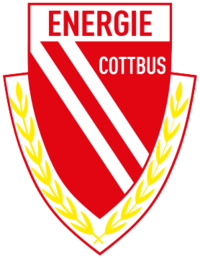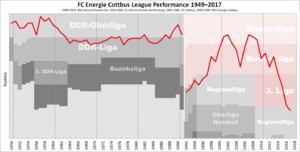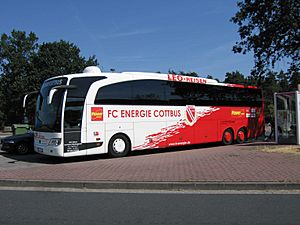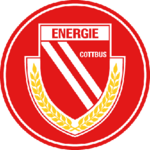FC Energie Cottbus facts for kids
FC Energie Cottbus is a German football club from Cottbus, a city in Brandenburg. The club started in 1963 as SC Cottbus in what was then East Germany. After Germany became one country again, Energie Cottbus played in the third division for six years. Then, for 17 years (from 1997 to 2014), they moved between the second and top German football leagues. From 2014 to 2016, they were in the third division, then went down to the fourth division. In 2018, they moved back up to the third division, but were relegated again the very next season.
Contents
Club History: How Energie Cottbus Started
Early Teams and Their Beginnings
Energie Cottbus has a long history that goes back to a team formed by coal miners in 1919. This team was called FV Grube Marga. The miners later started a new team, SV Sturm Grube Marga, in 1924. This team was later banned in 1933.
The East German Football Era
After World War II, the club started again in 1949. It changed names a few times, becoming SC Aktivist Brieske-Senftenberg in 1954. This team played in the top East German league, the DDR-Oberliga. In the early 1960s, they moved down to the second division.
In 1963, the players from this team joined a new sports club called SC Energie Cottbus. The East German government often moved players around for political reasons. They even named some sports teams after socialist heroes, like Franz Mehring, a German politician.
In the mid-1960s, football teams were separated from general sports clubs. The football club was briefly named after Bodo Krautz, then quickly became BSG Energie in early 1966.
German Reunification and Success
In 1990, when Germany reunited, the team changed its name to FC Energie.
Energie Cottbus became one of the few East German teams to do well in united Germany. After six seasons in the third division, the club moved up to the 2. Bundesliga in 1997. That same year, they were the first former East German club to reach the DFB Cup Final. In 2000, they even made it to the top league, the Bundesliga, and stayed there for three years. A key player during this time was Vasile Miriuță, a very creative midfield player.
After being relegated, Energie almost returned to the top league right away. They just missed out to Mainz 05 because of goal difference.
In the 2004–05 season, Energie had some tough times. They had money problems and struggled on the field. They only avoided going down to the third division by scoring one more goal than Eintracht Trier. In the 2005–06 season, the club finished third and returned to the Bundesliga.
The 2006–07 Bundesliga season was their best in the Bundesliga, finishing 13th. Energie Cottbus was the only club from former East Germany playing in the Bundesliga until 2009. They then stayed in the 2. Bundesliga for five more seasons until 2014. After finishing 18th, they moved back to the 3. Liga. In 2015–16, they finished 19th and went down to the fourth division, the Regionalliga Nordost.
Recent Seasons and Promotions
After two seasons in the fourth division, Cottbus returned to the 3. Liga in 2018. They won their play-off games against Weiche Flensburg. However, in the 2018–19 season, they finished 17th and were relegated back to the Regionalliga.
On May 21, 2023, Cottbus won the Regionalliga Nordost. This was their third time winning this league and their first since 2018. They played promotion games for the 3. Liga but lost to SpVgg Unterhaching. On June 3, 2023, Cottbus won the Brandenburg Cup for the 11th time. They beat FSV 63 Luckenwalde 4–1.
Cottbus finished the 2023–24 season as champions and were promoted to the 3. Liga.
Did you know that former German Chancellor Angela Merkel is an honorary member of the club?
Club Achievements and Trophies
The club has won several awards and titles:
- DFB-Pokal (German Cup):
- Runners-up: 1997
- 2. Bundesliga (Second Division):
- Promoted to Bundesliga: 2000, 2006
- DDR-Liga (East German Second Division):
- Winners: 1975, 1980, 1981, 1988
- Runners-up: 1965, 1968, 1973, 1978, 1986
- Regionalliga Nordost (Third/Fourth Division):
- Winners: 1997, 2018, 2023, 2024
- German Under 17 Championship:
- Runners-up: 2004
- Brandenburg Cup (Regional Cup):
- Winners: 1995, 1996, 1997, 1998, 2001, 2015, 2017, 2018, 2019, 2022, 2023, 2024
- DFB-Pokal U17 (German Youth Cup):
- Winners: 2011
Team Players and Staff
Current Squad Members
|
|
Coaching and Support Staff
| Position | Name |
|---|---|
| Director of Football & Manager | |
| Assistant Manager | |
| Goalkeeper Coach | |
| Athletic Coach | |
| Video Analyst | |
| Doctor | |
| Physiotherapist | |
| Technical Director | |
| Goalkeeping Co-ordinator | |
| Academy Manager |
Unique Moments: The All-Foreign Line-up
On April 6, 2001, Energie Cottbus made history. They were the first club in the Bundesliga to play a game with 11 foreign players on the field. That season, Energie often played with nine or ten foreign players. German players appeared only 83 times in total.
The players in that historic game were: Tomislav Piplica, Faruk Hujdurović, Bruno Akrapović (from Bosnia and Herzegovina), János Mátyus, Vasile Miriuță (from Hungary), Rudi Vata (from Albania), Moussa Latoundji (from Benin), Andrzej Kobylański (from Poland), Antun Labak (from Croatia), Laurențiu Reghecampf (from Romania), and Franklin (from Brazil). Even the three substitute players were from other countries!
Reserve Team: FC Energie Cottbus II
The club also has a reserve team, FC Energie Cottbus II. This team has played in high leagues like the Regionalliga. They last played in the Regionalliga Nordost in 2012–13. The team has also played in the fifth division, the NOFV-Oberliga Süd. They won league championships in 2007 and 2010. At the end of the 2015–16 season, the team stopped playing in competitions.
In 1998, the reserve team won the Brandenburgischer Landespokal, which is a local cup. This allowed them to play in the first round of the DFB-Pokal. In 1998–99, they lost 1–0 to SpVgg Greuther Fürth. In 2001–02, they lost 4–0 to Arminia Bielefeld.
See also
 In Spanish: Energie Cottbus para niños
In Spanish: Energie Cottbus para niños
 | Shirley Ann Jackson |
 | Garett Morgan |
 | J. Ernest Wilkins Jr. |
 | Elijah McCoy |





